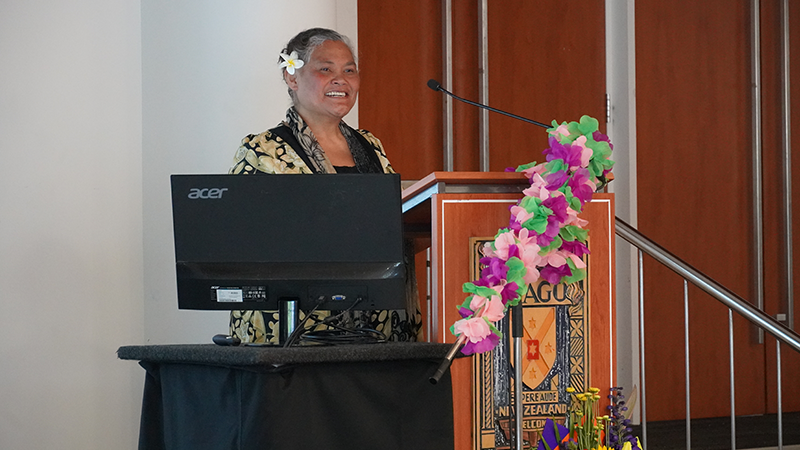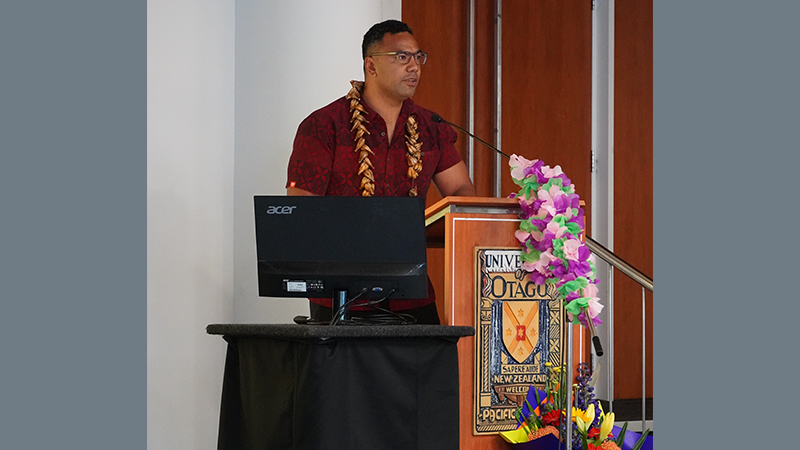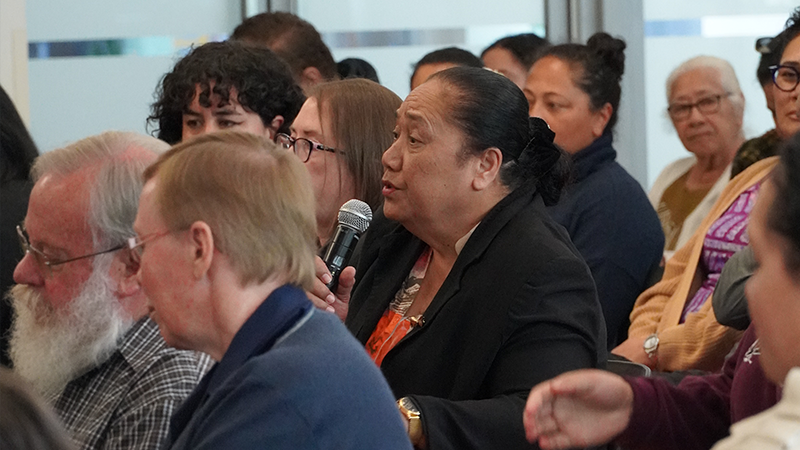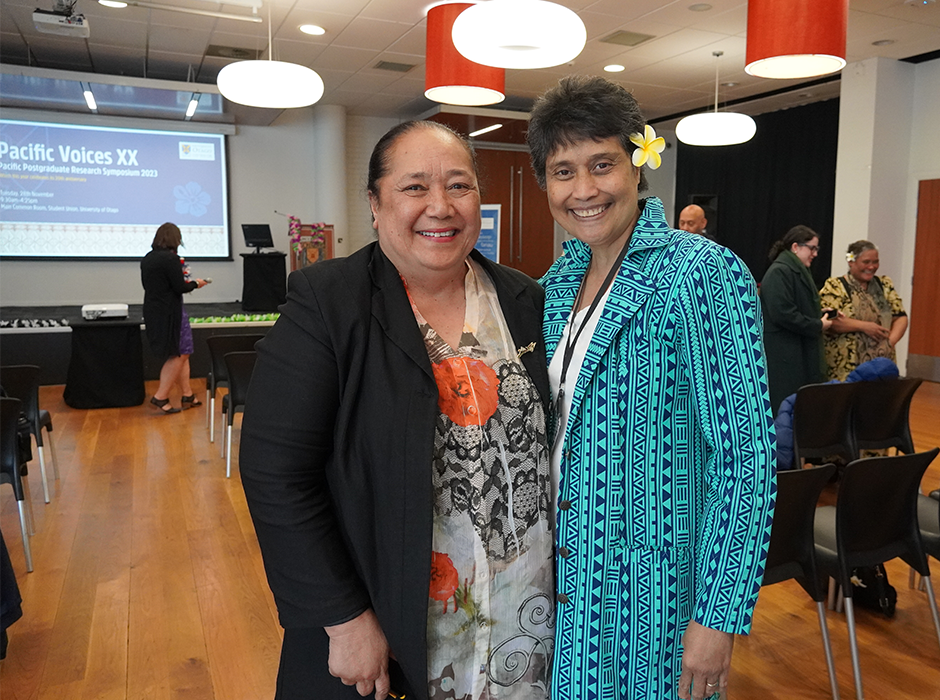
Faumuina Professor Fa'afetai Sopoaga (right), Dr Telesia Kalavite (left) & other distinguished Pacific academics were there to cheer on the presenters.
The Pacific Voices (PV) Symposium has long served as a site of growth, empowerment and connectedness for Pacific students.
This week, the University celebrates the two-decade history of the event that allows students to present their research, receive feedback from their respective communities and network with Pacific academics, field experts and postgraduate peers.
The Symposium has been well-attended by Pacific leadership in past years and PV alumni have themselves become distinguished leaders in their respective fields and communities.
Many Pacific academics now working for the University have passed through the PV support pipeline and keep in touch with their co-presenters.
PV was designed to equip students with the skills they need to enter their respective fields confidently.
Inaugural Manager of the Pacific Islands Centre Tofilau Nina Kirifi Alai established PV to provide academic and pastoral support for Pacific postgraduate students.
"When I first started at the Centre in 2002, my focus was on undergrads, but straight away, postgraduate students came.
"They were Fijians, Tongans and Samoans, not many of them at the time, who were lost on campus and saw the Centre as their place to call home.
"So what did I do? I reached out to the academic divisions with the inaugural Director of Summer School, Dr Claire Matthewson, who became my right hand."
Together, they started the Pacific Postgraduate Reference Group, running monthly seminars for postgraduate students to showcase their research. Those seminars concluded in November of that year with what would be the first PV Symposium of 20.
Director of the University of the South Pacific (USP), Samoa campus, Tootoooleaava Dr Fanaafi Aiono-Le Tagaloa completed her Bachelor of Laws with Honours, another double Honours in History and Law and then a PhD at Otago.
Dr Aiono-Le Tagaloa presented at PV throughout her postgraduate studies, the Symposium's abstract booklets signposting milestones in her academic journey.
Her doctoral thesis focused on the Land and Titles Court of Samoa, and she says the Symposium allowed her to run her ideas past an audience to see if they "gelled and resonated" with the people she was "doing the research for".
Dr Aiono-Le Tagaloa says the regular seminars were equally important and served a different purpose than the Symposiums.
"It's the camaraderie. Everyone would talk about their topics and the challenges they were having, and so you don't feel that isolation. You don't feel like, 'Is it just me?'.
"You always need that time out with people who understand what you're going through,” she says.
The seminars served as an informal mentoring succession pipeline for Pacific postgraduate students to "create a system that mirrors the experience at home".
"I think it's a Pacific thing - older sisters and brothers looking after younger sisters and brothers," Dr Aiono-Le Tagaloa says.
"There are people who are further along than you and people who are behind you."
"It's the opportunity to pass along what you know, and because you've been told by other postgraduate students what to expect, it doesn't come as such a surprise."
Like Dr Aiono-Le Tagaloa, University of West Indies lecturer Dr Keron Niles felt the PV Symposium created "the perfect learning space" in the years he presented.
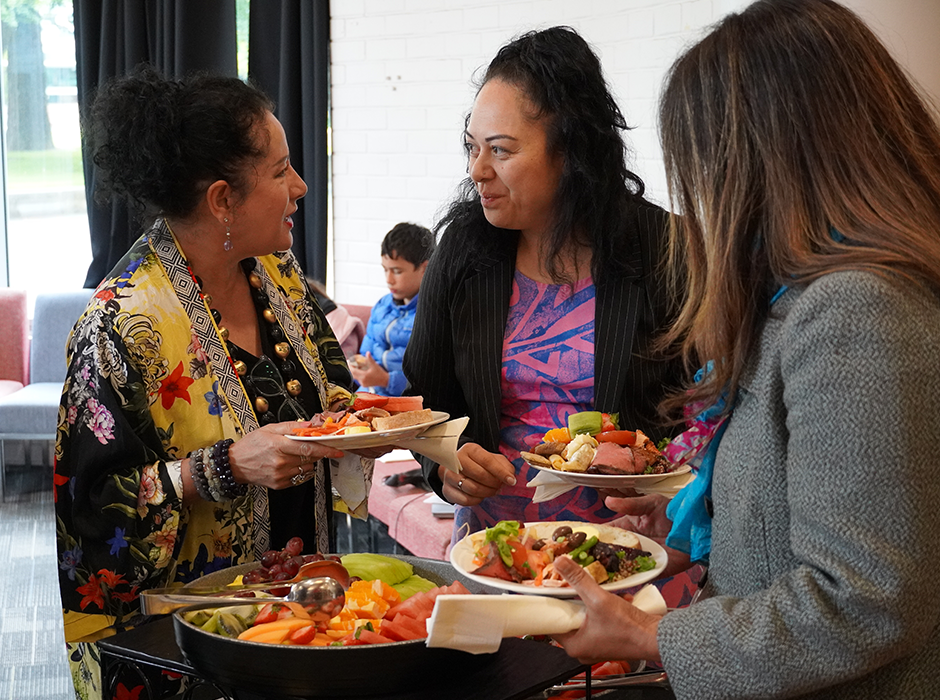
Dr Niles says the tradition of food and presentations was one of many things that drew him to Pacific Voices.
Dr Niles was welcomed to present at the Symposium each year as a non-Pacific student studying a topic relating to the Pacific region and also attended the seminars at the Pacific Islands Centre.
The environment of growth created at PV was like no other, allowing him to immerse himself in Pacific cultures and hear from Pacific audiences, he says.
"You're getting really useful feedback about the things you might have missed in terms of social contexts by the questions people ask."
What made PV a success year-after-year was the sustained support presenters received throughout the year, Dr Niles says.
"Nina had this amazing tradition of food and presentations. She spoke my language. That's how it is in the Caribbean as well.
"In the regular sessions at the Pacific Islands Centre, when people would get stuck in their presentation or make mistakes, many would freeze, and Nina would say, 'It's okay, it's just us'."
In turn, PV created a bonded "ecosystem of scholars" who collectively sharpened their skills and would give feedback to one another "in an environment that was safe and mutually reinforcing".
"This made presenting at the Symposium itself a lot more comfortable.”
Director of the Centre for Flexible Learning at University of the South Pacific, Dr Rajni Chand, came to Otago in 2004 to complete her PhD, becoming the first of three in her immediate family to graduate from Otago.
She says she "quickly became like furniture" at the Pacific Islands Centre and was involved in PV throughout her studies.
"Dunedin is very different from the Pacific Islands and Nina was there to provide the Pacific atmosphere that people felt was missing from other areas of the University."
Dr Chand found the PV structure to particularly benefit students who came directly from the islands, witnessing them gain confidence and command as they progressed.
PV allowed younger Pacific students to meet distinguished researchers in their area and see where their studies could take them, Dr Chand says.
"Nina told students that regardless of how much they had achieved in their study, they should tell others about what they're doing."
Dr Chand still contributes to the network of researchers that emerged from PV, providing feedback and support to Pacific students from Otago researching in the region.
For Kirifi-Alai, coordinating the PV was one of the "beautiful things" she got to do "with the support of many people".
"It was part of my role to equip these students so that they could go out confidently and share their knowledge with people. And if they went through their masters and then PhD and presented every year, imagine. They fly out!"
Kōrero by Keilah Vaetoru Fox
